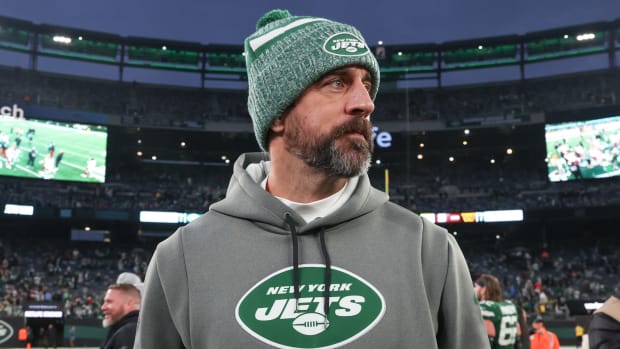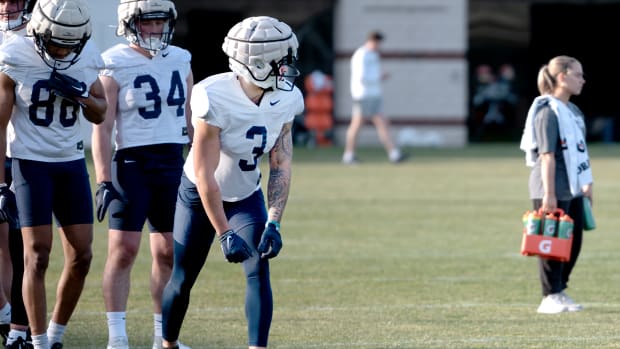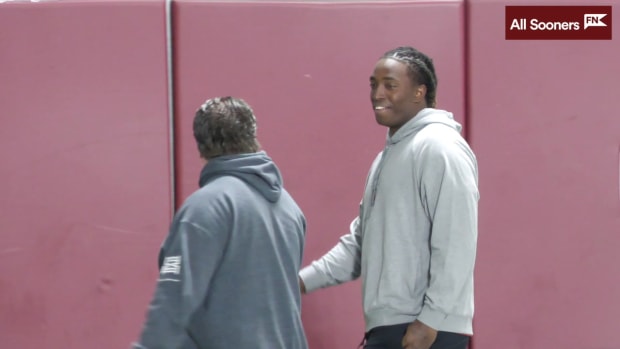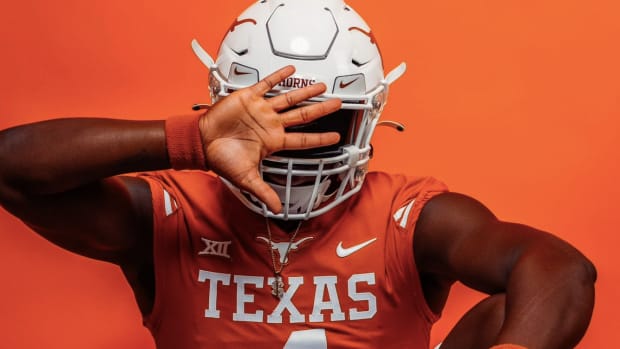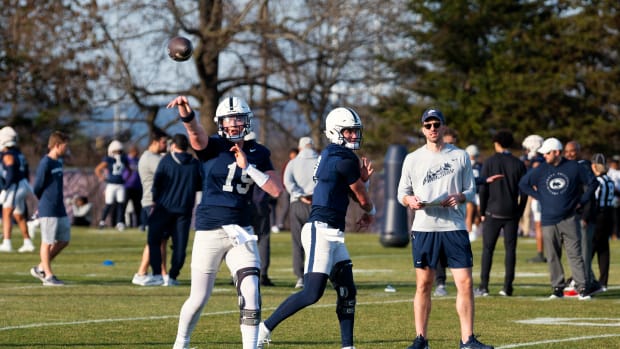What Can Be Done About Fake Recruiting Twitter Accounts?
“Fake” social media accounts are nothing new, but their influence on college football recruiting is becoming a concern that could compel the NCAA and its member conferences and schools to take action.
On Tuesday, a Twitter account associated with “Luke Hughes” revealed the ease with which online scammers can manipulate the recruiting community and potentially steal money from innocent people. @CoachLHughes is no longer active, but for a brief period the person controlling this handle claimed to be the account of the Tennessee Vols’ director of player personnel and recruiting coordinator.
In reality, the Vols do not employ anyone named “Luke Hughes” nor do they list the position of recruiting coordinator in their online directory. The Vols' director of player personnel has been Drew Hughes, not Luke Hughes, and the closest title for “recruiting coordinator” is director of football recruiting, a position held by Bethany Gunn. Meanwhile, Drew Hughes is leaving the Vols to become the South Carolina Gamecocks’ director of player personnel. It appears news of his departure sparked the creation of @CoachLHughes.
@CoachLHughes attempted to give the Twitterverse a credible impression. Here is a screenshot taken by Kenyatta Watson, the (real) director of player personnel and football operations at USA Academy:
The account tries to mimic how a recruiter for a college football team might structure their Twitter page. The person’s job titles and allegiance to the Vols program are emphasized. This is apparent by @CoachLHughes incorporating the hashtags #PoweredByTheT and #GBO, which stands for “Go Big Orange.” Ties to the Vols are also suggested by a supposed location of Rocky Top, which is associated with the athletic program, and use of a profile photo with a man wearing a Tennessee cap (the photo is apparently of Drew Hughes).
At the same time, there were reasons to question the authenticity of @CoachLHughes. For one, the account had just been created. While real new people join Twitter all the time, many “bots” and fraudsters also join only to be purged by the platform within days or weeks. Waiting a bit to interact with a new account isn’t a bad idea. @CoachLHughes also followed only one account. The absence of followed accounts isn’t by itself disqualifying but it is unusual and raises a red flag. Further, @CoachLHughes was not verified. The lack of verification does not necessarily invalidate the legitimacy of the account—especially for a new account that might take time to be verified—but it means that Twitter has not yet confirmed the authenticity of an account that purports to be in the public interest. Lastly, a quick Google search of the Tennessee program would show that no one named Luke Hughes works for Tennessee football.
Still, @CoachLHughes is deceptive, especially when its intended audience includes high school football players who eagerly hope to be noticed by a major program—particularly one that plays in the Southeastern Conference—and parents who genuinely believe their sons deserve to play in a high-profile program like Tennesee's. This is a vulnerable audience that seeks affirmation.
@CoachLHughes attempted to exploit this dynamic in several ways. The person controlling it encouraged players interested in being recruited by the Vols to tweet @CoachLHughes their Hudl profile. Hudl is a web service commonly used in the recruiting world. A player’s Hudl profile includes, among other things: height, weight, position, graduation year, 40-yard dash times and other measurements, game footage and video highlights, athletic awards, grades, test scores and contact information for the recruit and their parents. A search of @CoachLHughes on Twitter shows that several recruits tweeted their profiles at the handle.
After getting responses, @CoachLHughes then entered into direct-message exchanges with recruits, supposedly to arrange visits. Watson posted one exchange on Twitter, with @CoachLHughes directing a recruit to send a $20 fee that would “let us know that you are serious about the visit.” @CoachLHughes further advised that payment could be made by sending a physical check to the admissions office or directly through Cash App so that the coach could “turn it right now.”
The exchange is problematic on several levels. A school would not demand payment from a recruit to show that they are “serious” about a visit. Also, an admissions office would not receive payments from prospective students. Payments at universities are handled by business services, accounting and financial aid offices. Further, @CoachLHughes gave two payment options when only the second would appeal to a young person: snail-mail a physical check to an admissions office or pay “Coach Hughes” directly through an app. It’s obvious which route a person born in the 21st century would take.
@CoachLHughes is not the only scam account in college football recruiting. Fake coaches claiming to represent Tennessee, South Carolina, Southern Cal, FIU and UAB football assistants have all been exposed. New hoax accounts seem to be appearing by the day. It’s unclear how many people have been victimized by these scammers.
What can be done?
The best defense against being scammed online is to confirm the authenticity of the person(s) seeking money or information before providing it. As mentioned above, a recruit could have Googled the Tennessee Vols’ website. He would have then seen that “Luke Hughes” is not listed and that the position titles were off, too. Other steps include emailing the university email address of a recruiter and using email to communicate information, including a Hudl account, with them.
Also, recruits should immediately cease communication with a recruiter who demands payment. A request that the recruit pay a fee so that they can prove sufficient “seriousness” violates NCAA rules—recruiting must be conducted through official channels and in coordination with compliance officers employed by athletic departments. It’s likely illegal, too. If it’s too late and payment has been conveyed, the recruit should still contact the company used to facilitate payment. That company might still be able to stop the payment and also provide information on who received it.
In addition, the Twitter community can report hoax and fake accounts to Twitter. This appears to have happened with @CoachLHughes and with similar accounts, as they are no longer up.
There are more substantial measures that could be taken.
Most significantly, law enforcement could prosecute fake coaches for fraud, extortion, conspiracy and other possible charges. The U.S. Justice Department prosecutes economic crimes, including attempts to steal people’s money through online scams. Identifying and locating the scammers could prove difficult for investigators, particularly if the scammers are located outside of the country. However, if law enforcement sees that this is a prevalent scam and the fraudsters need to be deterred, criminal charges are more likely to be brought.
Victims of the fake accounts could also sue the scammers for fraud, extortion, interference and other claims. Again, identifying the scammers could prove challenging. Also, social media companies’ privacy policies limit disclosure of users’ information. However, those policies are not absolute. Twitter, for example, has exceptions on withholding information about a user, including in regard to matters of exploitation. These policies can be challenged within civil litigation, too.
Social media companies themselves could be viewed as responsible for providing a platform that makes fraudulent acts possible. Yet legal claims against those companies would face stiff headwinds. Social media companies’ terms of service normally require that the user relinquish possible claims against the company as a condition of using the service. In addition, Section 230 of the Communications Decency Act generally immunizes web publishers, including social media companies, from possible liability stemming from users’ content. There are exceptions from this shield, including for copyright infringing material and for sex trafficking content, but those exceptions are narrow.
The NCAA, as well as member conferences and schools, might also consider steps to better educate recruits and their parents on scams. The NCAA obviously can’t police the internet. It also has no control over the creation and use of Twitter accounts. At the same time, the NCAA was founded in 1906 not to prevent payments to student-athletes for their labor or to deny them compensation for their names, images and likenesses—those prohibitions would surface later on. Instead, the NCAA was founded to “establish minimum standards to create a safe and healthy environment for student-athletes competing in intercollegiate athletics.” A sensible interpretation of that objective would include formal measures to warn recruits, parents and both college and high school athletic staff on scammers and what steps ought to be taken in response.
John Garcia Jr. contributed to this story.
Michael McCann is SI’s Legal Analyst. He is also an attorney and the Director of the Sports and Entertainment Law Institute at the University of New Hampshire Franklin Pierce School of Law.
